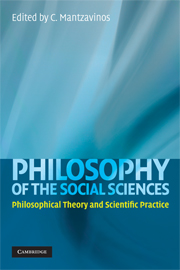Book contents
- Frontmatter
- Contents
- List of Contributors
- Acknowledgements
- Introduction
- Part I Basic Problems of Sociality
- Part II Laws and Explanation in the Social Sciences
- Part III How Philosophy and the Social Sciences Can Enrich Each Other: Three Examples
- 8 Why Do People Cooperate as Much as They Do?
- Comment
- 9 Situations Against Virtues: The Situationist Attack on Virtue Theory
- Comment
- 10 What Kind of Problem is the Hermeneutic Circle?
- Comment
- Epilogue
- Name Index
- Subject Index
- References
8 - Why Do People Cooperate as Much as They Do?
Published online by Cambridge University Press: 05 June 2012
- Frontmatter
- Contents
- List of Contributors
- Acknowledgements
- Introduction
- Part I Basic Problems of Sociality
- Part II Laws and Explanation in the Social Sciences
- Part III How Philosophy and the Social Sciences Can Enrich Each Other: Three Examples
- 8 Why Do People Cooperate as Much as They Do?
- Comment
- 9 Situations Against Virtues: The Situationist Attack on Virtue Theory
- Comment
- 10 What Kind of Problem is the Hermeneutic Circle?
- Comment
- Epilogue
- Name Index
- Subject Index
- References
Summary
Introduction
Why do humans cooperate as much as they do? Stated at this level of generality, it seems obvious that this question has no single answer. The same person may cooperate for very different reasons in different situations, depending on the circumstances in which the cooperation occurs, the behavior, and motivation of others with whom they cooperate and so on. Moreover, both casual observation and (as we shall see) experimental evidence suggest that people differ in type, with self-interest playing a larger or more exclusive role in explaining cooperative (and non-cooperative) behavior among some people, and non-self-interested motives (which may themselves take a variety of different forms but often involve dispositions toward conditional rather than unconditional cooperation) playing a larger role among other subjects.
Nonetheless, one finds in philosophy, social science, and evolutionary biology a number of different stylized accounts of why cooperation occurs, often presented as mutually exclusive alternatives. In what follows I explore some of these, with an eye to assessing their explanatory adequacy. I begin with the familiar idea that cooperative behavior can be understood simply as an equilibrium in a repeated game played by self-interested players. I suggest there are substantial empirical and theoretical problems with this idea and that the empirical evidence predominantly supports the view that cooperation often involves interactions among players of different types, some of whom are self-interested in the sense that they care only about their own monetary payoffs and others of whom are best understood as conditional cooperators of one kind or another, or, as they are sometimes called, strong reciprocators; e.g., Fehr and Fischbacher (2003), Henrich et al. (2004), and the essays in Gintis, Bowles, Boyd, and Fehr (2005).
- Type
- Chapter
- Information
- Philosophy of the Social SciencesPhilosophical Theory and Scientific Practice, pp. 219 - 265Publisher: Cambridge University PressPrint publication year: 2009
References
- 1
- Cited by



